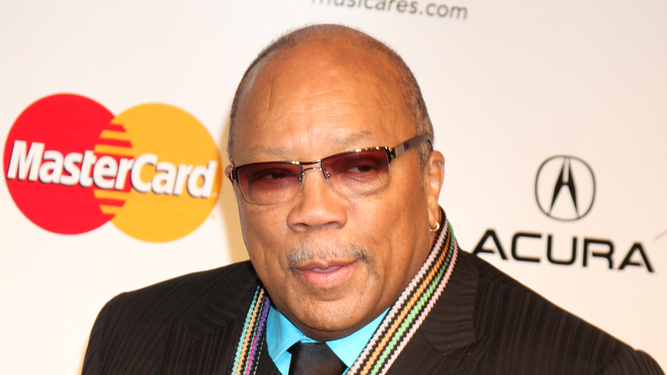Quincy Jones: A Musical Legacy That Shaped Generations
The legendary music producer Quincy Jones has passed away at the age of 91, leaving behind a remarkable legacy that spans decades and genres. Known for his groundbreaking work on Michael Jackson's historic "Thriller" album and his award-winning film and television scores, Jones's influence in the entertainment industry is unparalleled. His publicist, Arnold Robinson, confirmed that Jones died peacefully at his home in Bel Air, Los Angeles, surrounded by family.
Who Was Quincy Jones?
Quincy Delight Jones Jr. was born on March 14, 1933, on the South Side of Chicago, Illinois. He was the son of Quincy Jones Sr., a carpenter, and Sarah Frances, a domestic worker. Raised in a modest household, Jones faced the realities of a challenging upbringing, including poverty and racial discrimination. His early exposure to music came from his mother, who sang in church, and it wasn’t long before he began to show remarkable talent as a musician.
At the age of 14, he began playing the trumpet and was influenced by the sounds of jazz that permeated his neighborhood. His passion for music led him to attend the Chicago Musical College, where he studied composition and arrangement. After graduating, he began his career as a trumpeter and arranger, which would lay the groundwork for his future successes.
Achievements and Contributions
Quincy Jones's musical catalog includes some of the most iconic works in American history, showcasing his exceptional creativity and collaborative spirit. Here are just a few highlights from his illustrious career:
Early Career
Jones's career began in the late 1950s when he worked as a trumpeter and arranger for various artists. His talent quickly propelled him into the spotlight. In 1956, he became the musical director for the legendary jazz musician Count Basie, which marked the beginning of his extensive career in music production. By the late 1950s, Jones had moved to Europe, where he further honed his skills and gained valuable experience.
Breakthrough with Frank Sinatra and Ella Fitzgerald
In the 1960s, Jones established himself as a leading figure in the music industry, working with some of the biggest names in jazz and pop music. He arranged timeless records for artists like Ella Fitzgerald, Frank Sinatra, and Ray Charles. His collaboration with Sinatra included arranging the classic "It Might As Well Be Spring," which showcased his ability to blend orchestration with vocal performance seamlessly.
The "Thriller" Phenomenon
Jones's most significant achievement came in the 1980s when he produced Michael Jackson's "Thriller," released in 1982. This album became the best-selling album of all time, featuring iconic hits like "Billie Jean," "Beat It," and the title track "Thriller." Jones’s innovative production techniques transformed the music landscape, setting new standards for pop music and music videos. The "Thriller" music video itself became a cultural phenomenon, blending narrative storytelling with groundbreaking choreography.
Film and Television Scores
Jones composed award-winning scores for films and television series, most notably the groundbreaking miniseries "Roots," which aired in 1977 and earned him an Emmy Award. The miniseries, based on Alex Haley’s novel, chronicled the history of an African-American family from slavery to freedom. Jones's score played a pivotal role in enhancing the emotional depth of the series and is remembered as one of his most significant contributions to film music.
A Cultural Ambassador
Quincy Jones was not only a masterful musician but also a skilled networker and cultural ambassador. Throughout his career, he connected with presidents, global leaders, and stars alike. Notably, he orchestrated President Bill Clinton's inaugural celebration in 1993, bringing together an eclectic mix of artists for a historic performance that celebrated American diversity.
Awards and Honors
Jones's impact on music and culture has been recognized globally, solidifying his status as a true icon. Throughout his career, he received numerous accolades, including 28 Grammy Awards, making him one of the most awarded artists in Grammy history. He also received a Grammy Lifetime Achievement Award in 2016 and was honored with an Academy Award nomination for his work in film. His contributions to music were further recognized when he was awarded the Kennedy Center Honors in 2016, celebrating his influence and artistry.
Advocacy and Philanthropy
Beyond his musical achievements, Jones was also deeply committed to social justice and philanthropy. He founded the Quincy Jones Listen Up Foundation, which aimed to empower youth through education and music. Throughout his life, he advocated for racial equality and supported various humanitarian efforts, emphasizing the importance of giving back to the community.
The Legacy of Quincy Jones
Quincy Jones's legacy extends far beyond his impressive discography. He inspired countless musicians and producers, demonstrating the power of collaboration and innovation in the music industry. His ability to blend genres and cultures made him a trailblazer, and his contributions have left an indelible mark on American music and entertainment.
As the world mourns the loss of this legendary figure, we celebrate the life and achievements of Quincy Jones, a true pioneer whose influence will continue to resonate for generations to come. His music, vision, and passion for creativity will forever be cherished, ensuring that his legacy lives on in the hearts of fans and artists alike.
Personal Life
Quincy Jones's personal life was as dynamic as his career. He was married three times, first to Jeri Caldwell, then to actress Peggy Lipton, with whom he had two daughters, Rashida and Kidada. He later married and divorced actress and model, and his relationships often made headlines due to his high-profile connections within the entertainment industry.
Jones also had six other children from various relationships, and he was known to maintain strong connections with all his children. His family often spoke of his dedication to his craft and his unwavering support for their endeavors.
Quincy Jones was not just a music producer; he was a cultural icon whose work transformed the entertainment landscape. His remarkable life story serves as a testament to the power of perseverance, creativity, and collaboration in the face of adversity. As we remember his contributions, we honor the man who gave the world a soundtrack to celebrate and remember.
Quincy Jones's legacy will forever be celebrated as one of the greatest in music history. His innovative spirit and tireless dedication to the art form have inspired countless artists and will continue to influence the music industry for years to come.











